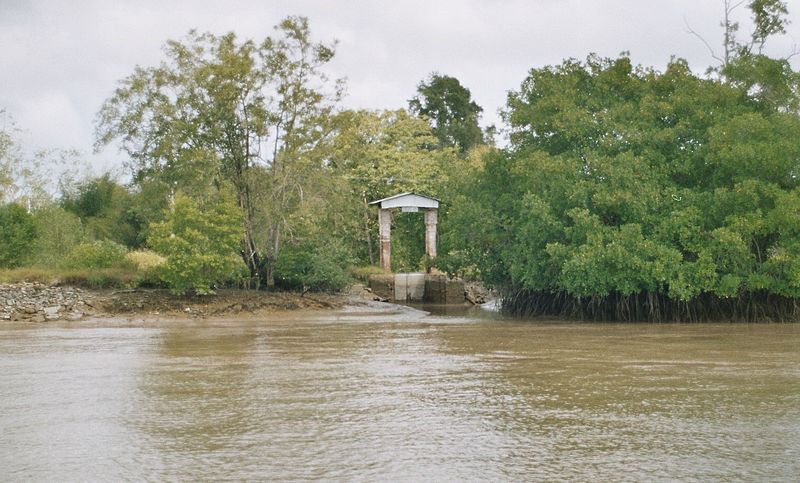This weeks’ photo prompt:

Today’s Dragon’s Bidding:

Rules: Word limit: 150 word story (10-word leeway) based on the photo prompt and dragon’s bidding.
This is my entry for this week’s contest (160 words).
THE GATE TO FREEDOM
‘My father’s grandfather died in 1830. He was born in Africa, made captive, sold as a slave by his own countrymen, and brought to Surinam to work in the sugar plantations. After escaping to the rain forest, he was caught, and both his feet were cut off, so that he could not escape again. It was a slow, painful death.
Don’t ever forget you owe your freedom to that man, and make sure you bring your sons and daughters here, on the 1st of August, at least once in your life.’
‘But father, I don’t understand. You were born in London, and I was adopted in China.’
‘Son, this proud, crumbling door is all that remains of a water-mill, which belonged to a sugar refinery dating back to 1830, before the emancipation of slaves. That gate, which nature has tried unsuccessfully to bury, holds the memory of something none of us can remember, and yet we must never forget.’
*****
Have a look at some of the other entries here.
Basic background information to the Abolition of Slavery in the British Empire.
On August 29th, 1833, a new law for the gradual abolition of slavery was passed in the British Parliament, in London.
The freedom of slaves came in two stages. The first was on the first of August 1834, which marked the emancipation of all slaves in the British Colonies.
On that day, it is said that many slaves walked up hills and climbed trees to witness the dawning of the first day of their freedom. Thousands attended ‘Divine Services’ to give thanks and praise on the Caribbean islands.
It was, however, a case of gradual freedom with conditions. The only slaves freed were those who were not yet born and those under six years of age.
All other slaves were to enter a six-year apprenticeship during which they were to continue working on the plantations, without pay, for their former masters, for 40 hours a week, in exchange for food, clothing, medical care, and provision grounds on which they could grow their own food. They could also hire themselves out to other plantations and earn more wages and buy their freedom. This apprenticeship ended in four, instead of six years, on the first of August, 1838, when the second stage of freedom started.
On this occasion, a hearse containing shackles and chains which had been used to reduce rebellious slaves was driven through the streets of Spanish Town, Jamaica, and burned.
Sugar plantations have played an important role in Surinam’s history. Today tourists can still see water mills which belonged to sugar refineries, although they are now abandoned and covered with vegetation.
We cannot change the past, but we can remind ourselves of our collective past, honour the people who struggled for a better world, and work hard to ensure that the things we are not proud of, should not happen again.

Great history and interesting to compare to our own history of slavery here in the US.
LikeLike
Thanks! I’m helping out my daughter with her two children (2 months and 15 months!) So I’m running behind… on everything!
LikeLike
The story of my life!
LikeLike
I got your address from ronovanwrites. Happy I did.
LikeLiked by 1 person
Thank you so much for visiting, reading and commenting. Sorry for the delay in replying.
LikeLike
Thanks for letting me camp out in your blog for a little while today. I had a great time and tried to leave my campsite as good as when I arrived. I’ll be back!
LikeLike
Thank you for dropping by and looking around 🙂 Glad you enjoyed it, and you’re most welcome to come back 🙂
LikeLike